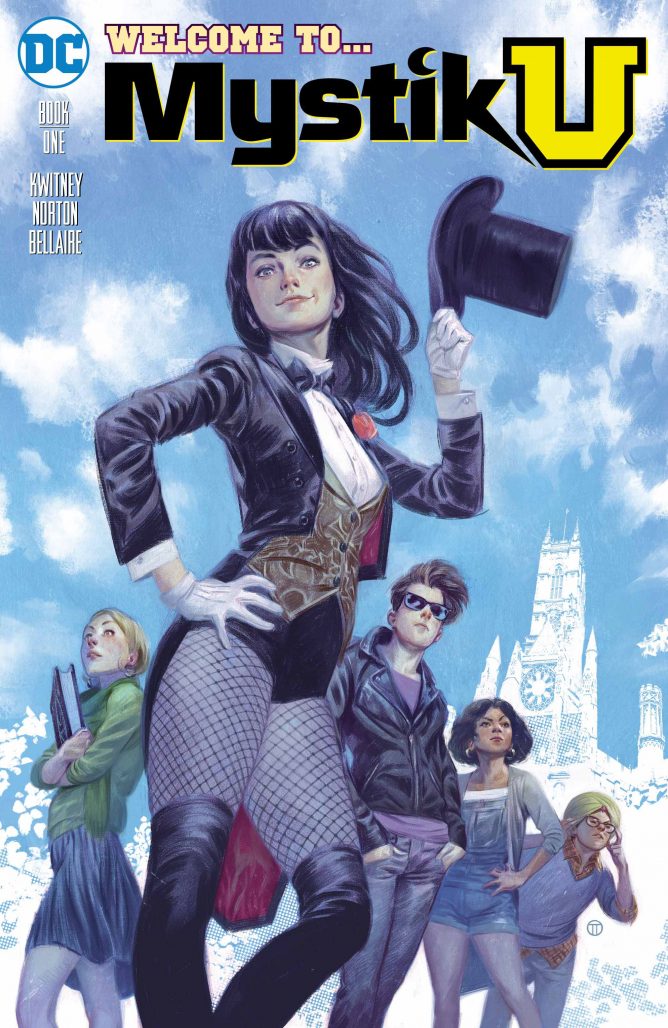
Mystik U, in simplest terms, is somewhat like what would happen if you recast the Harry Potter series with DCU magicians. But it’s more than that. Set on a magical college campus, Kwitney and artist Mike Norton follow five fledgling magicians including a young Zatanna and Sebastian Faust who are only just coming into their powers. They’ve come to Mystik University to learn how to control their abilities, but a dark prophecy hangs over their heads. One of them will become the Malevolence, an evil force destined to destroy the world. And the only way to stop it is to stop their friend before they reach the peak of their powers.
Both a wonderful character study and fantasy adventure, Mystik U #1 released this week and is well worth your time. Recently, we sat down with Alisa Kwitney to discuss the new series and what she hopes it will mean to the world.
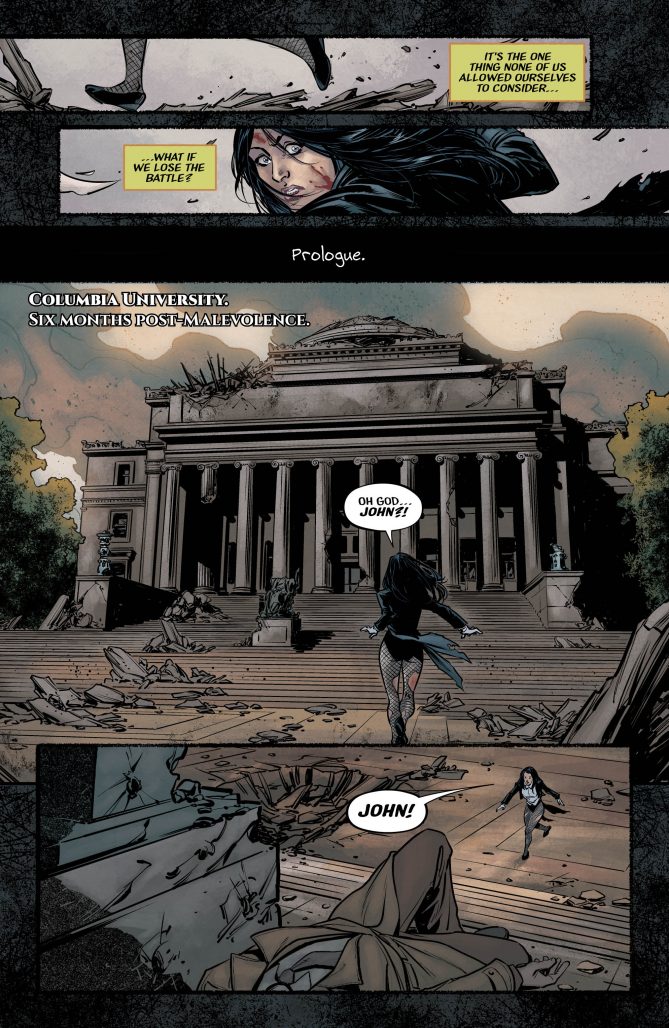
Alisa Kwitney: Oh that’s such a good question. I think that Mystik U is giving me a chance to play with characters I’ve never had the chance to play with before– it’s giving me the chance to work in the magical side of the D.C Universe. I got a little bit of that ages ago when I got to do a dreaming story with Cain and Abel, but I haven’t had the chance to do this in such a long time.
I grew up as a comic book fan. Before I was a Vertigo editor, I was a reader who was reading House of Mystery, House of Secrets– all of these old horror tales. One of the things I did when I was on staff is compile a bunch of the old stories I loved, and I did a welcome back to the House of Mystery. The chance to play with these locations and these characters [again] is feeding my inner fan girl.
Lu: What is it that draws you to towards telling stories about magic?
Kwitney: I think magic is such a great metaphor for the creative endeavors that we all try to do. I think you go to college and you want to express yourself creatively and intellectually. You want to find the thing that you’re good a, and that you can excel at. There’s the book. The joy of being exposed to new ideas and new ways of doing things, as well as the horror of discovering the things you thought you were good at not coming as easily anymore. There’s all this different level of competition.
I feel like there’s something that’s really relatable in terms of magic in college. I know that for me, going to college was this amazing theater where everyone was performing themselves and improvising themselves. It felt like there was a mystery to the magic of doing yourself right academically and socially…and sometimes I felt like I didn’t know where that information was kept.
Lu: Correct me if I’m wrong, but I think Mystik U was originally announced before Rebirth back in 2015. Why did the title get shifted to 2017?
Kwitney: I think I always had the spark of the idea for Mystik U, but at that moment in time there was so much going on. There was so many moving pieces and DC was moving [offices]. I was also teaching just about full time at that point and I don’t think all the ingredients were coming together in the ideal…how can I say this? In the original [incarnation,] I think that the mandate was a little different, so it didn’t make everything come together in the same way that it did when I came back, which is when I discovered that I could have Zatanna as a student. Something about [having her character as a student] just made everything come into focus for me.
I feel like that was the beginning of everything clicking.
Lu: The first issue of Mystik U really kicks off with a bang– Zatanna performs a spell for the first time and immediately sends her dad down to hell on accident. And then she’s at school within just a few pages. That’s got to be quite a traumatic couple of minutes for her.
Kwitney: Yeah. I think [that’s] one of the benefits of a story that has been marinating for a long time. First of all, a lot happens, but a lot happens in a way that really puts a lot of emotional and psychological pressure on the characters so that really interesting things emerge from it. Its not just random things happening, and now we have to fight. [The story is] going to be a complete emotional arc. I’m very excited to have been working on this. It feels like a really rewarding story to have worked on.
Lu: Right. I love Zatanna so I’m overjoyed to see her here. She’s probably one of the prominent magicians in the DC Universe, but I also feel like she never gets her due. What attracts you to her as your lead?
Kwitney: I think that it’s a couple of things. She’s a performer and I kept thinking about her as someone who on the one hand had all this fame and reputation, but on the other hand probably didn’t have a lot of experience going to school with other kids and being in competition with them. There’s ways in which she is more mature than the other kids and ways in which she’s less. It’s just sort of a interesting moment in time to get a chance to explore her.
Lu: How did you go about assembly the other members of the lead cast? What is it that attracts you to say putting Enchantress or Sebastian Faust on the team as opposed to, say, John Constantine?
Kwitney: What I wanted were characters where I’d get a chance to explore…how they would interact as a group. I really liked Sebastian Faust because he had this really interesting back story, but didn’t have a lot of baggage attached to him. Constantine’s an amazing character, but I’ve seen so many amazing stories told by so many people, and I think that I felt very…there’s this Yiddish term, chutzpah, and I felt like I had the chutzpah to really play with Sebastian because I didn’t come to him with as much foreknowledge. He’s got this cool background, and back story. He’s got this power where he can suck people’s souls out with his eyes. I just thought that made for a really interesting character because he’s always got to keep himself sort of covered and concealed. He’s not in control of this but is also sort of playing with being this cool customer and bad boy, so he’s already got a bit of a reputation when he comes to the school.
As for the other characters– I think that two of the things that interests me as a reader and as a writer are alliances and female friendships. I don’t think that’s traditionally been explored as much as comics. You get a lot of male friendship and male bonding with ensemble work with teams because the traditional thing has been the five man band where one of the roles is a girl with a tambourine. What you get [with that] is the girl’s relationship to the guys. You don’t get as much rivalry and you don’t get as much of a particular special sauce of female friendship.
In fact, you probably do get more rivalry emphasized when women are being written together, but I think if anything, friendship is even more important to teenage girls and young women than perhaps to…I don’t want to say more, but it’s a huge, important thing in young women’s lives.
I think there’s also a kind of jealousy. A platonic jealousy of oh, which friend is closer, and all of those psychological group dynamics. So that interests me as well.
Lu: Right. Absolutely. That complication. That sort of interplay between people who have different roles in a school like that. That’s the sort of thing you might expect to find in a story like The Breakfast Club.
Kwitney: Yes. Although again, The Breakfast Club is interesting because you’ve only got two female characters and they don’t really relate to each other until the very end where one gives the other a makeover. I feel if John Hughes had been a woman there wouldn’t been…not that I don’t love The Breakfast Club, but I do feel that there are missed opportunities sometimes that male writers don’t see because they think of female characters as being a thing to the side, or a thing apart, and to me a team is about male and female very equally.
Lu: The emphasis on the word “team” here is interesting. When I first imagined Mystik U, I thought it would look more like a school drama rather than the story of a superhero team coming together.
Kwitney: Not a super hero team, but a friend group. I don’t think they’re a team in a…they’re not the Magical Avengers. Actually, let’s not say that, that’s the wrong…they’re not the magical…
Lu: Justice League Dark?
Kwitney: They’re not Justice League Dark, but what they are is a group of friends who are going to have all of these complex emotional, and psychological connections with one another. I think that is what makes them really interesting. I think that’s part of what makes a group story a really interesting story to tell.
Lu: Absolutely. I know that you’ve compared the book a couple of times to Harry Potter.
Kwitney: Again, I have to say that I didn’t mean to, but it’s sort of the elephant in the room. People have brought that up. I have to say that I think there’s a big difference between boarding school stories, and college stories. I think that it’s so easy to look at the similarities, but when Harry Potter and his friends start school they’re 11 years old. That’s a really different experience in a lot of ways than what you’d get in college.
Lu: Right, right, right. The kids in Mystik U are a little bit more emotionally developed.
Kwitney: I think they are also not as supervised. Well of course, Harry Potter and his team escape supervision, but I think the set up of college is different. You are being asked to join on your own resources. That is definitely part of the paradigm. Being American and having a college experience but no boarding school experience– [the story] definitely came out of my own background.
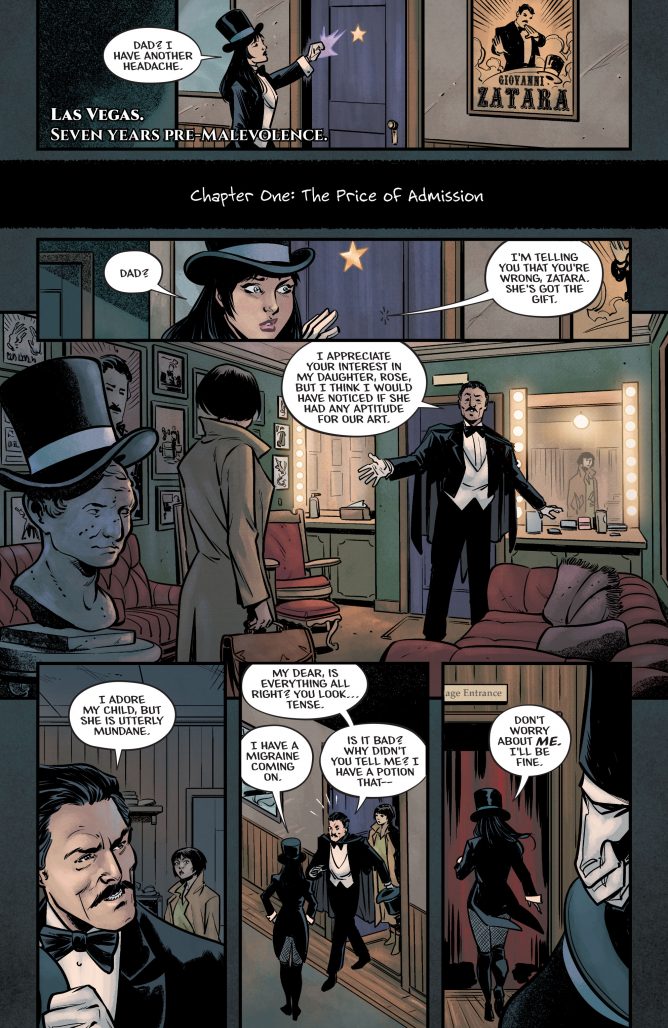
Kwitney: Ah, the Malevolence. Well, part of what we don’t know going in is which of the characters is likely to become the Malevolence. It’s always interesting to me as a storyteller to explore not only how people become heroic, but how people become villains; how much is the villain’s arc similar to the heroes’ arc, or the anti-heroes’ arc? I think that in college there’s a lot of this question: “am I going to achieve greatness, and what form will this take?” This [story] is a way of exploring that.
Lu: So there are lots of paths to infamy, let’s say. You have the Breaking Bad mode of grasping at power at any cost. You have the Mad Men mode of being haunted by our past demons which drive us to vices. What mode can we expect to see here?
Kwitney: I would say that I am a great believer that our vices are also our virtues, and our virtues are also our vices. The very things that you can point to as our strengths, and that really can make us achieve wonderful things can also, with a very slight twist, be the things that make us monstrous.
Lu: Okay. Hard left turn. Mike Norton’s art is EVERYTHING. Beautiful. And right off the bat, I love the way that he incorporates modern fashion into the wardrobe of the characters in Mystik U. What’s the collaborative process between you and him for this sort of thing?
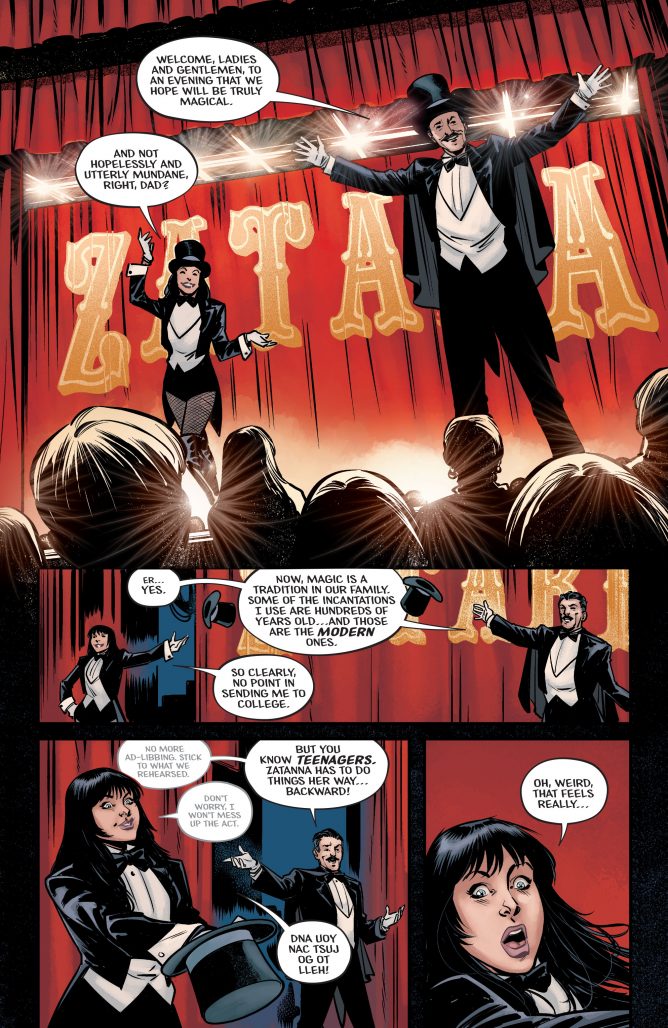
One of the things I really wanted for both Zatanna and Enchantress in this incarnation is that I wanted them to be lovely. Obviously, they are beautiful young women, but I didn’t want them to be costuming themselves in a very sexy, corseted, high heel boots kind of way. This is college. That’s not the way most of the young women I knew back when I was in college were, or the young women I see now in college are, dressing. I wanted [their looks] to feel like an authentic college kind of look, and I feel he achieved that completely.
Also, I see myself as always writing for men and women equally. I’m hoping that this comic will appeal equally so that you can definitely crush on the male or female–and we also have a character who’s sort of neither gender–leads. But we didn’t want there to be sort of any kind of objectified image. I think Mike achieved that amazingly.
He also went to town on the location, and I feel like part of the pleasure of reading a book like Mystik U is that you come to this magical Harvard, or Princeton, or Yale. You’re going to see these amazing Gothic buildings. You’re going to walk through the Autumn landscape. You’re going to have this specific sense of place. Mike really just [captured\ every little Gothic detail of Rose Psychic’s office, the House of Secrets, the dorms, and the subterranean areas. He’s done such a good job.
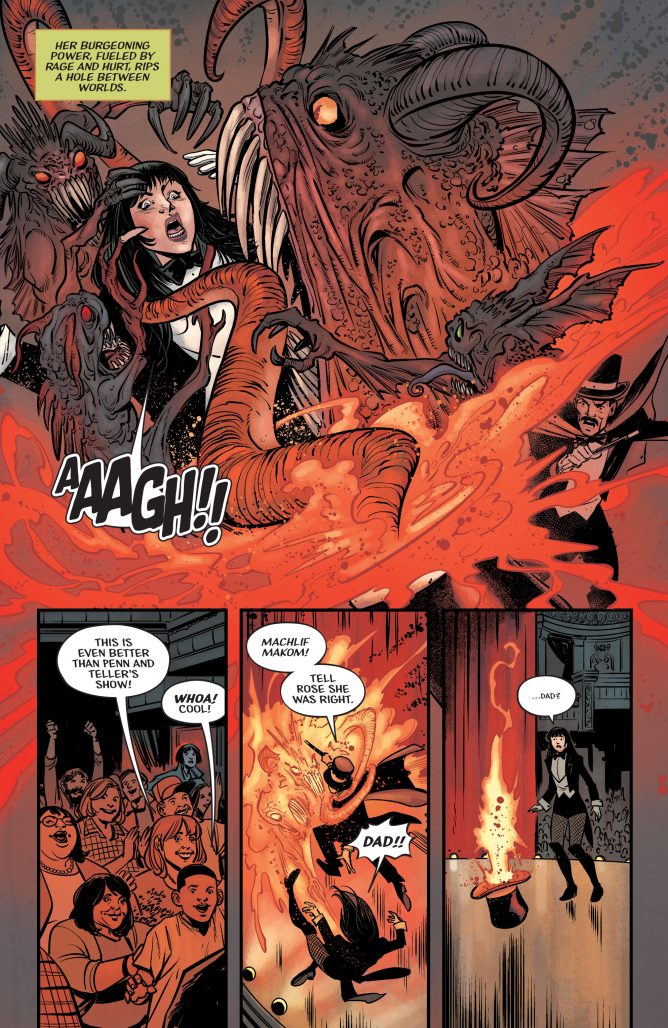
Kwitney: With Pia, I think one of the great fun things a writer can do is to not only reinterpret and play with characters, but outwardly create something for others to play with after [they are done]. I wanted a character who is a bit of a Betty Rizzo from Grease. I wanted someone who was a wise cracker, and clever, but also high achieving. I think that when there is a wise cracking character, by default they always end up being male. I wanted a character who was wise cracking, but female.
I also knew that Pia was a way to sort of create a slightly more representative cast because if you’re only dealing with characters as they have been created traditionally, you end up a slight glut of Caucasian characters by default. Pia Morales was named for my friend Bob Morales who wrote comics and unfortunately died a little too young, so I kind of feel like I wanted him to know he was remembered in that way.
I should also mention that my take on Rose Psychic. I don’t think in her original [incarnation] that she had a clear ethnicity but probably by default she too seems sort of Caucasian. However, I just wanted her to look a bit like Ming Doyle– I did ask Ming. Again, I want hopefully for the comic to some extent to look a little bit more like the world that I live in.
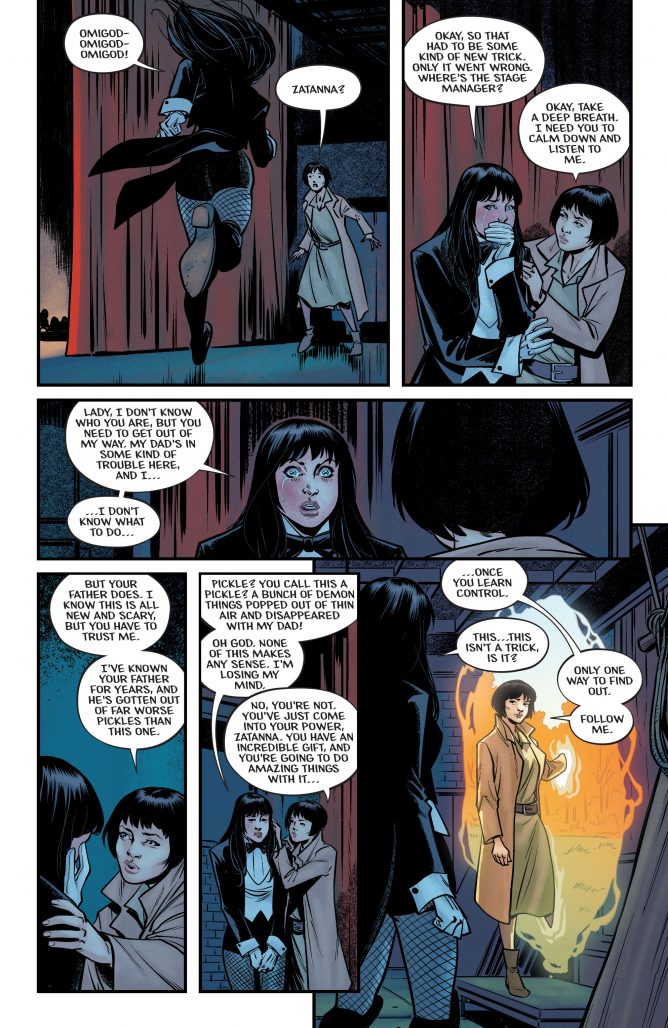
Kwitney: That’s a complicated question. I doubt that my little comic is going to make much of a difference, and yet I think we definitely need all that we can to combat the forces that work in the opposite way. I was in my local post office, and I don’t know how this happened, but I end up getting into a conversation with two women on the line. They were complaining about the fact that you can’t say “Indian chief” anymore, and “what is it with people being offended by being called by a term that is no longer politically correct?” I said “well, people feel like that term comes with a lot of baggage,” and one of the women said “oh, now that goes too far.” I thought, well it makes me feel glad to hopefully have a comic with some awareness.
Again, I don’t think I am the best at this, but I am aware that there are a lot of people who feel like [political correctness] all goes too far, and I say it has not gone far enough.


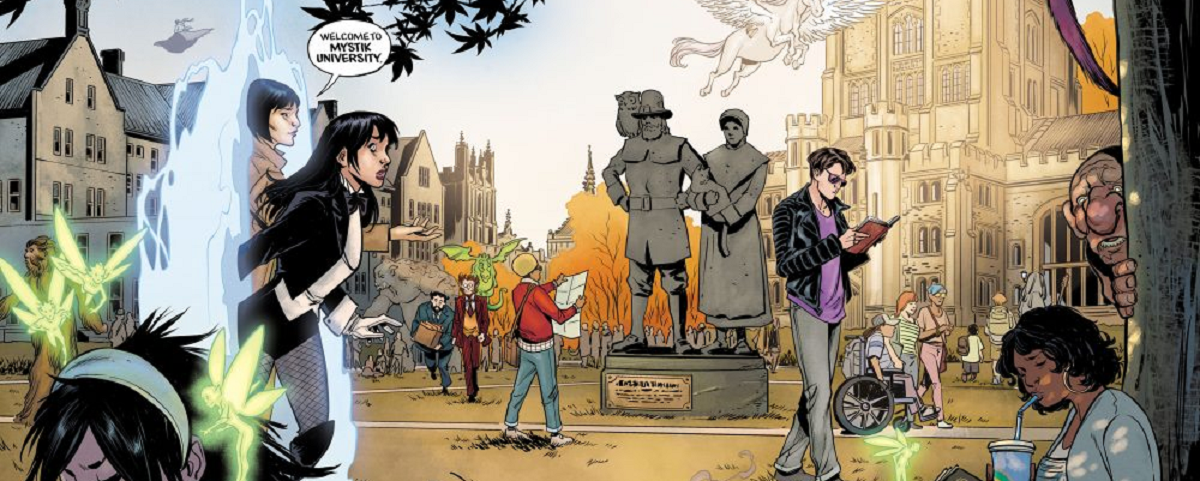
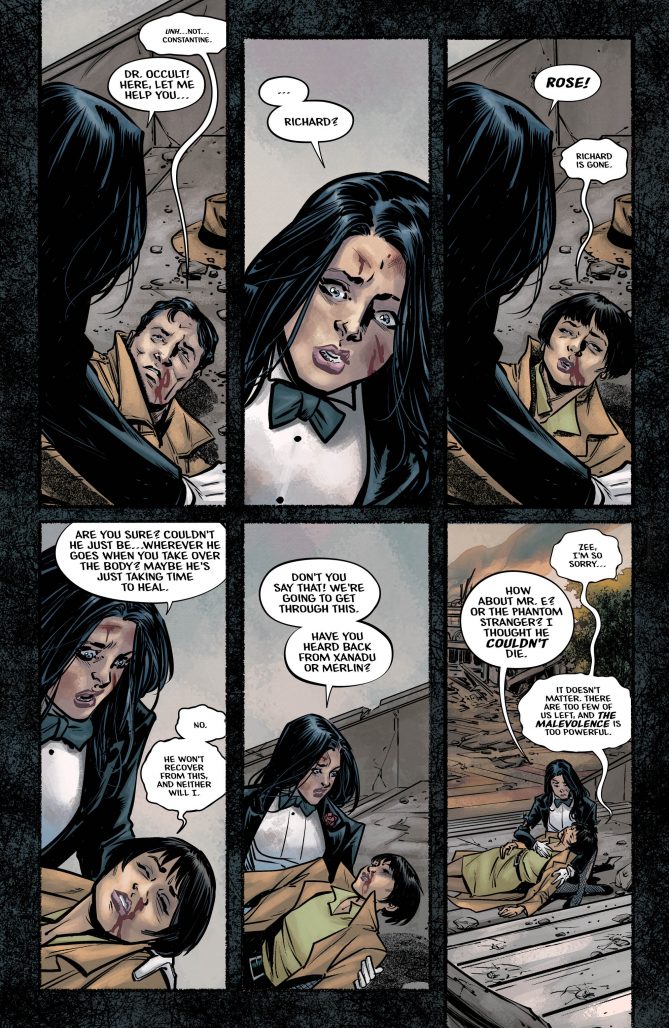
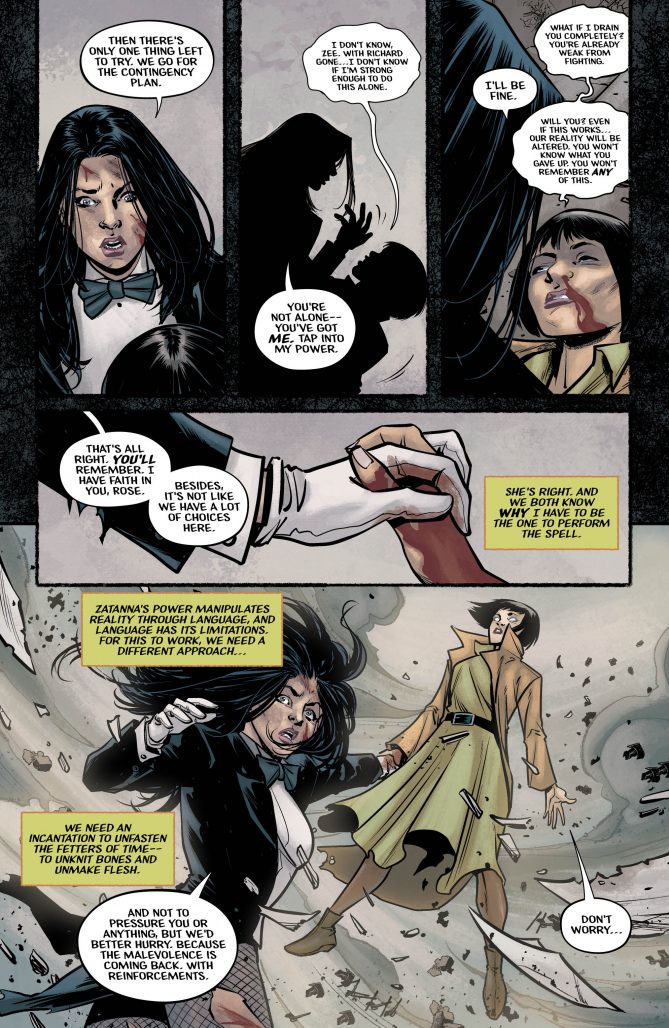
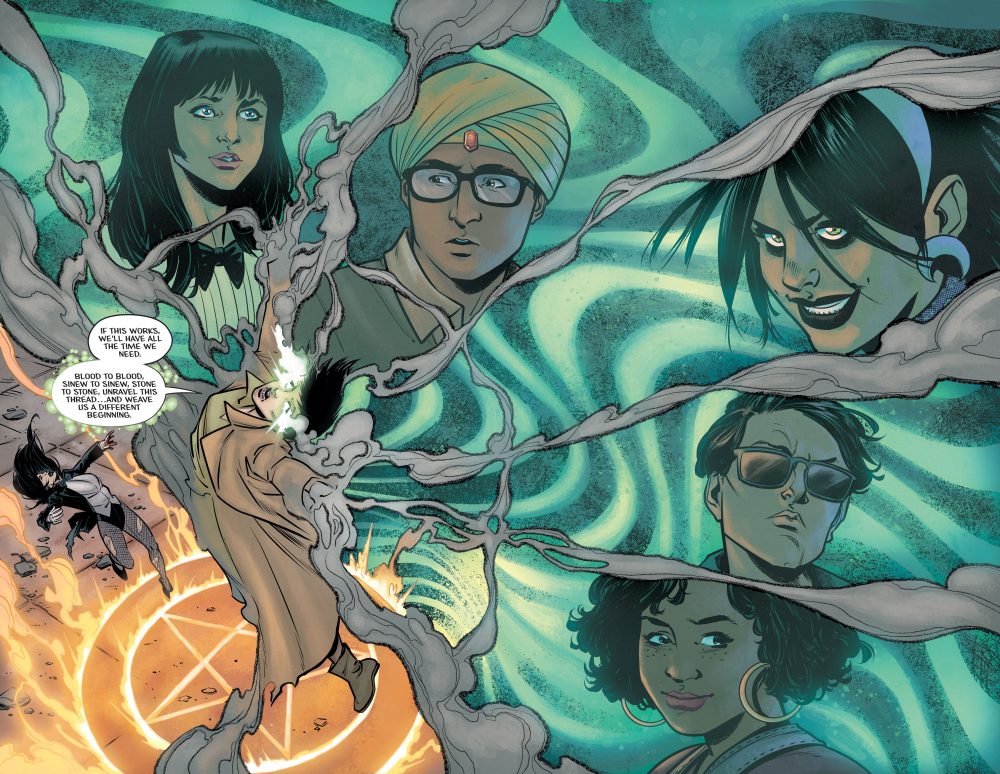
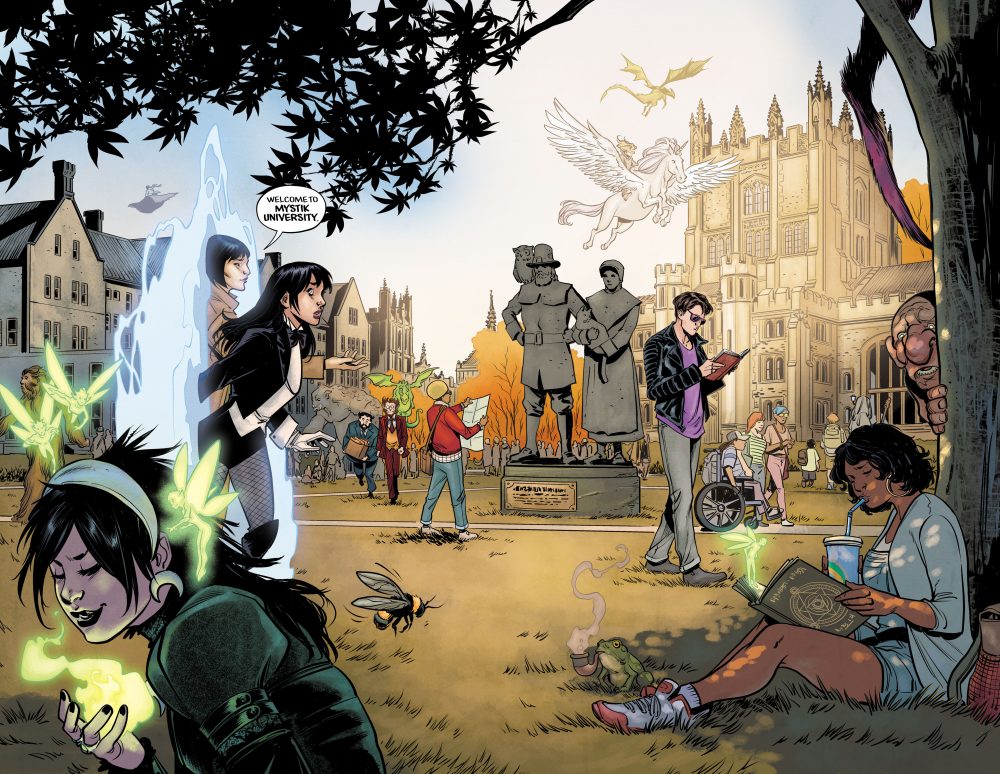
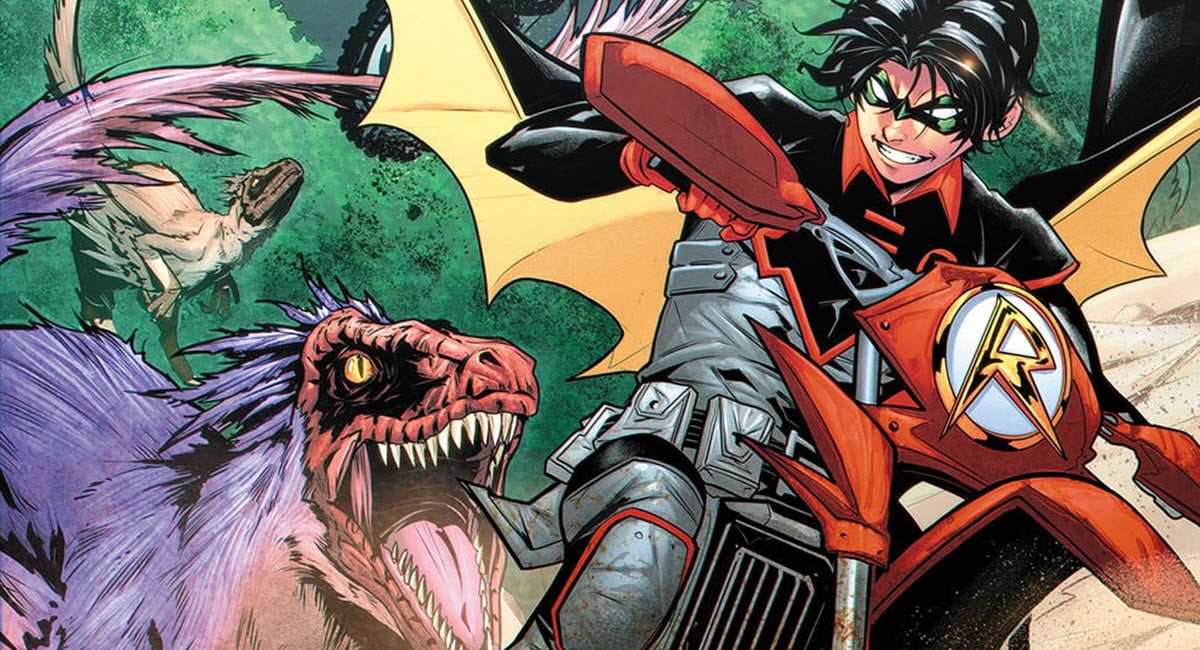
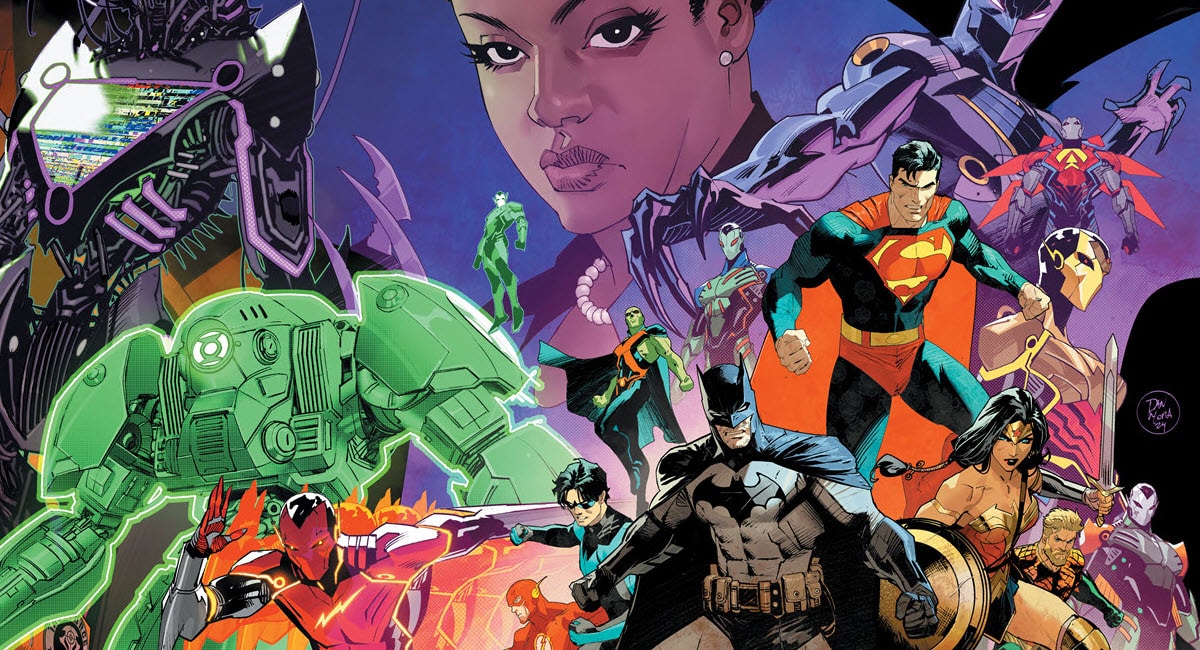
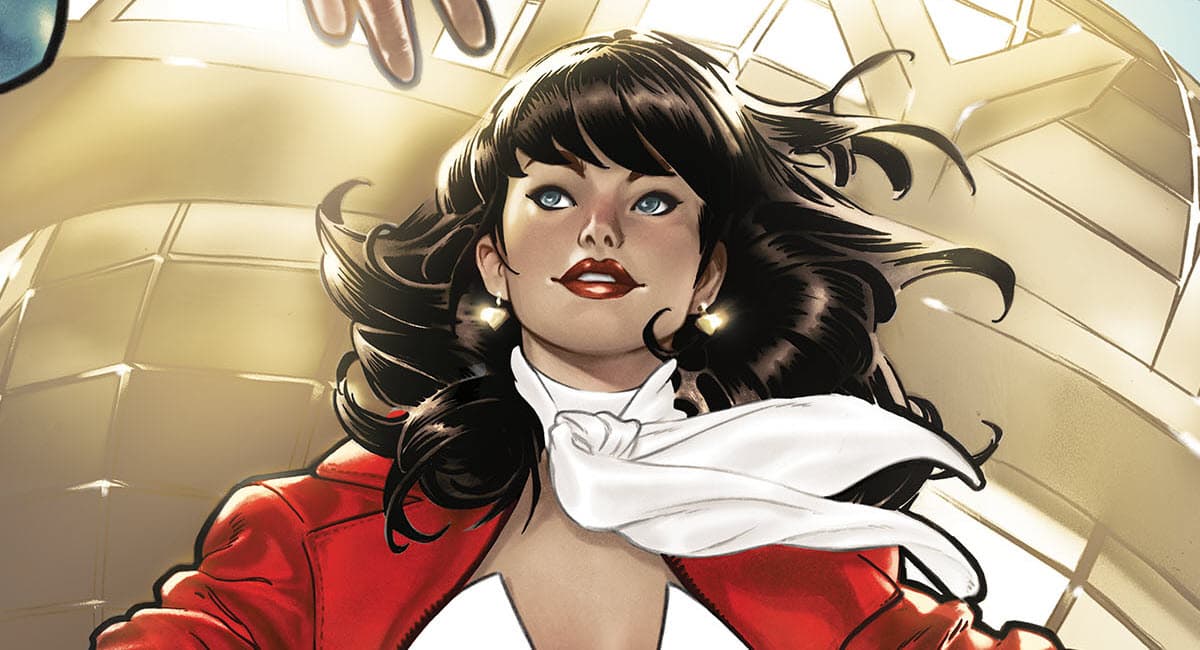


I liked the first issue. Nice to see Cain and Abel being used as well as the other character that ends up being part of the group that is not mentioned in the article at all… I’m hoping to hear more about how she decided to make that character part of the story…
Comments are closed.